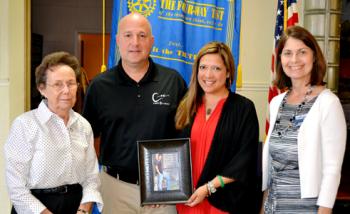
Rotary Club of Crowley Program Organizer Georgie Petitjean, far left, and President Mary Zaunbrecher, right, welcomed, from left, Hans and Jenn Nelson (holding a photo of the late Christian Nelson) Tuesday. The Nelsons created Christian’s Legacy, to promote organ donation following their son’s death and subsequent donation process.
Through tragedy, ‘Christian’s Legacy’ was born
Jeannine LeJeune is the online editor for the Crowley Post-Signal. She can be reached at jeannine.lejeune@crowleytoday.com or 337-783-3450.
Two years ago Hans and Jenn Nelson received the worst news a parent can think of receiving, their son, Christian, 19 at the time, had been brought to the hospital following an accident at work.
The Nelsons made their way to Lafayette, Lourdes specifically, and were met by the hospital chaplain, they knew then that the news wasn’t good.
After surgery, the neurosurgeon informed the Nelsons that Christian would not make it.
Then, the beginning of a new journey in their lives took place. Approached by LOPA (Louisiana Organ Procurement Agency), customary procedure in these situations, Jenn Nelson recalled a conversation she and her son had when he went to get his license to drive about organ donation.
“Why wouldn’t someone do that?” he asked his mother then.
“What a prophetic quote,” said Hans Nelson Tuesday as he recalled the incident during the Rotary Club of Crowley’s weekly meeting. “Kind of an off-handed comment. A 16-year-old kid, the world is very simple to him. ‘Well, of course, I’ll do that. Everybody probably does that’.”
Christian Nelson opted for organ donation that day and through that decision helped save four lives and the sight of two people. His tissue was used in about 100 people.
It isn’t often that a 19-year-old with no offspring, no business of his own, can leave a legacy, but Christian had.
The Nelsons created the foundation Christian’s Legacy and made it their mission to work alongside LOPA and educate about organ donation.
“After the dust settled for our family, we realized without being called to do something, we had been called to do something, and that was to perpetuate his legacy,” said Hans Nelson.
Years and years from now, the Nelsons want to see the foundation continue to grow and possibly even help other families in these situations. But, for now, the Nelsons are working to give back to LOPA and to make the public more knowledgeable and dispel some of the common misconceptions and misinformation that is associated with organ donation.
Most commonly, people believe that organ donation recovery surgery will harm the body. Hans Nelson explained Tuesday that that couldn’t be further from the truth.
“The body is treated with the utmost respect,” he said.
He added that the surgery for the organs is incredibly non-invasive.
Those organs can help save up to nine lives as well as the sight of two people.
The second biggest misconception is that life-saving efforts will not be made. But, in fact, all efforts will be made before donation becomes an option.
And, even if you register to be an organ donor, the chances of all factors, including how you die, falling into place is, at maximum, 4 percent.
But, as Hans Nelson pointed out, just think if every person in the United States opted in, the chances of the approximately 120,000-plus people in need of a transplant — 2,000 in Louisiana alone — surviving would be greatly increased.
Another alarming statistic shared with Rotarians Tuesday: Each day, 18 people die waiting for a transplant.
The final point the Nelsons stressed was letting family and friends know that you are an organ donor, if you are one. If you are a donor, but your spouse, kids, family, etc., opt out, then that is the end of the conversation. Thus, it is important to let family and friends know of your wishes in regard to organ donation.
For more information on organ donation, or to register as an organ donor, visit LOPA.org.
- Log in to post comments
